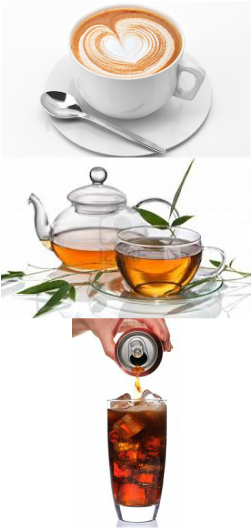Detoxification: Caffeine Use & Withdrawal

We are a world that runs on caffeine - 80-90% of adults worldwide use caffeine regularly…(disclosure: I am one of them)…I have also learned that withdrawal can be awful, luckily caffeine withdrawal is short lived. I encourage you to take a look at the information below and seriously consider reducing your caffeine intake.
Why would I give up my coffee/pop/tea?
Caffeine is a great fast acting stimulate because, unlike other substances, it is able to pass directly through the blood brain barrier and directly impact your brain cells. Once in your brain, caffeine blocks your brain’s adenosine receptors. (Adenosine is responsible for triggering feelings of tiredness and sleepiness.) Once the adenosine receptors are blocked you feel awake and you may also feel ‘good’ as your dopamine kicks in. So far this all sounds great…here come the bad part…Caffeine stimulates the production of stress hormones that will increase your heart rate, blood sugar levels, blood pressure, respiration rate and feelings of anxiety and panic. Essentially caffeine triggers a classic fight-or-flight stress reaction.
In the short term as the caffeine is metabolized (2-8 hours depending on your metabolism) the spike of energy you got from the stress hormones will dissipate and leave you hungry (mostly for the quick energy - sugars and simple carbs) and more mentally and physically depleted than you were before the caffeine hit. Chances are this will lead you to reach for more caffeine to get you through your day, keeping your body in a chronically stressed "flight-or-flight" mode.
Over time the constant fight-or-flight stress reaction triggered by caffeine can deplete your body and cause adrenal exhaustion resulting in: a chronic fatigue state; anxiety disorders; mental dullness; an inability to concentrate; depression; mood swings; sleep disturbances and/or chronic insomnia; and, general irritability. Unfortunately, chances are if you are feeling any of these symptoms you are more likely to consume even more caffeine to make it through your day.
Living in a state of constant stress is very demanding on your body. Mentally the condition that develops from over-caffeination looks very similar to post traumatic stress syndrome. On a physical level excessive or prolonged caffeine consumption has been linked to:
Why would I give up my coffee/pop/tea?
Caffeine is a great fast acting stimulate because, unlike other substances, it is able to pass directly through the blood brain barrier and directly impact your brain cells. Once in your brain, caffeine blocks your brain’s adenosine receptors. (Adenosine is responsible for triggering feelings of tiredness and sleepiness.) Once the adenosine receptors are blocked you feel awake and you may also feel ‘good’ as your dopamine kicks in. So far this all sounds great…here come the bad part…Caffeine stimulates the production of stress hormones that will increase your heart rate, blood sugar levels, blood pressure, respiration rate and feelings of anxiety and panic. Essentially caffeine triggers a classic fight-or-flight stress reaction.
In the short term as the caffeine is metabolized (2-8 hours depending on your metabolism) the spike of energy you got from the stress hormones will dissipate and leave you hungry (mostly for the quick energy - sugars and simple carbs) and more mentally and physically depleted than you were before the caffeine hit. Chances are this will lead you to reach for more caffeine to get you through your day, keeping your body in a chronically stressed "flight-or-flight" mode.
Over time the constant fight-or-flight stress reaction triggered by caffeine can deplete your body and cause adrenal exhaustion resulting in: a chronic fatigue state; anxiety disorders; mental dullness; an inability to concentrate; depression; mood swings; sleep disturbances and/or chronic insomnia; and, general irritability. Unfortunately, chances are if you are feeling any of these symptoms you are more likely to consume even more caffeine to make it through your day.
Living in a state of constant stress is very demanding on your body. Mentally the condition that develops from over-caffeination looks very similar to post traumatic stress syndrome. On a physical level excessive or prolonged caffeine consumption has been linked to:
|
|
Am I addicted to caffeine?
Probably. If you regularly consume more than 100mg of caffeine on a regular basis the chances are good that you are addicted to caffeine. The average adult in North America consumes more than 280mg daily! Some studies indicate that 100% of people who consume more that 100 mg of caffeine a day will experience some sort of withdrawal symptoms, with about 50% reporting a headache and about 13% experiencing significant distress and/or functional impairment.
It is very easy to get 100mg of caffeine. The caffeine in a in a small (very small) 250ml serving of:
- Coffee is 95-200 mg
- Decaffeinated coffee is 8.6 mg to 20 mg.
- Black tea is 14-61 mg
- Green tea is 24-40mg
- Cola is 21-25mg
What does caffeine withdrawal look like?
Withdrawal can occur as quickly as 2 hours after your last ‘hit’ of caffeine, although for most people withdrawal symptoms usually begin about 12 hours later. The symptoms of caffeine withdrawal can last anywhere from a 2 to 9 days and tend to peak in intensity around 20-51 hours off caffeine.
The symptoms of caffeine withdrawal can be intense, and can include: cravings for caffeine, feelings of anxiety, a headache (unaffected by aspirin or other over-the-counter painkillers), fatigue, lethargy, drowsiness, decreased contentedness, depressed mood, difficulty concentrating, irritability, fogginess, flu-like symptoms (sinus issues, nausea, vomiting, etc.) muscle pain & stiffness, constipation, and sleep disturbances.
It is important to know that the greater your dependence on caffeine the greater the intensity and duration your withdrawal symptoms will be. Please plan for this.
It takes at least 2 weeks off caffeine for your body to withdraw, reset and heal. Depending on the extent of your adrenal exhaustion it may take much longer than 2 weeks for your body to heal. If you suspect that you are suffering from adrenal exhaustion (periods of fatigue; anxiety disorders; mental dullness; an inability to concentrate; depression; mood swings; sleep disturbances and/or chronic insomnia; and general irritability) contact me and get the support you need to heal faster.
What are some withdrawal strategies and tips?
Cold Turkey
Stopping all caffeine consumption abruptly is the most common and the most dramatic strategy. The main benefit of this strategy is 'getting it over with as soon as possible’. The downside may be overwhelming withdrawal symptoms. I recommend that you carefully consider this option if you are a heavy caffeine consumer that already experiences withdrawal symptoms when you miss your regular fix.
Reducing Consumption
Weaning yourself off caffeine over a period of 2-5 weeks before cutting it out all together is another common strategy. Ways to reduce your consumption include:
- Cutting consumption by 15-25% a week
- Switching to a lower caffeine beverages like tea or naturally decaffeinated coffee
- Mixing in an increasing amount of naturally decaffeinated tea/coffee to your regular brew
Tips
- Plan for it - you will not be at your best. Consider starting on a Thursday or a Friday so that you will be over the worst of it come Monday morning.
- Tell the people around you – your friends, family and coworkers can be a great source of support and encouragement. It will also help if people around you are prepared for any behaviour changes, and are being considerate and extra nice to you for a few days.
- Eat healthy well balanced meals rich in complex carbohydrates, protein and vegetables - especially breakfast. You need energy. Snack on healthy snacks throughout the day - like apples, raisons and natural unsweetened nut butters.
- Follow the Body Basics section of my detox protocol
- Boost your energy naturally with these ideas and herbal teas that contain ginseng, ginger, liquorice, ginkgo biloba, rosehips, mint, astragalus, or nettle.
If you find that your withdrawal symptoms are too unpleasant to bear or overwhelming contact me and I can provide the support you need to get through it.
Do I have to give caffeine up forever?
No. Moderate and ideally sporadic use of caffeine may actually be healthy. If you quit caffeine and go through withdrawal then you need to wait at least 2 weeks give your body time to reset and recover. The more severe your withdrawal symptoms the longer you should wait – your body needs time to heal.
Ideally you should wait to restart caffine consumption until you have broken your patterns and habits. You are the best judge of your behavior and habits. If you can enjoy drinking caffeine moderately and sporadically then there is no problem. I know that for me any kind of regular coffee consumption (more than 2 a week) quickly leads to over consumption. So I limit my intake to the occasional mug on the weekends.
If you do restart caffeine, please seriously consider eliminating the use of sugars and sweeteners. Sugars and sweeteners magnify the negative effects of caffeine use.
Aren’t coffee and tea good for me?
Moderate, under 100 mg of caffeine, and/or sporadic consumption of tea and coffee may actually be good for you. Both are loaded with antioxidants and have been linked to:
- The prevention of autoimmune diseases such as multiple sclerosis
- Decreased rates of Parkinson’s disease and Alzheimer’s
- Inhibition of the formation of gallstones
- Reducing the risk of stroke
- Improving cholesterol levels
Information Links
Caffeine content for coffee, tea, soda and more
Withdrawal syndrome after the double blind cessation of caffeine consumption
A critical review of caffeine withdrawal: empirical validation of symptoms and signs, incidence, severity and associated features
10 Things You Might Not Know About Caffeine
This Is How Your Brain Becomes Addicted to Caffeine
Coffee addiction is harmful to your health

